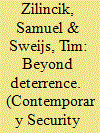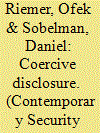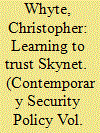|
|
|
Sort Order |
|
|
|
Items / Page
|
|
|
|
|
|
|
| Srl | Item |
| 1 |
ID:
189935


|
|
|
|
|
| Summary/Abstract |
Contrary to detailed work on deterrence by punishment, Western strategic thought about denial and its effects is conceptually muddled at the expense of effective strategy-making. This article seeks to reconceptualize denial and rethink its emotional effects. It defines denial as a strategy aimed at frustrating the adversary’s military power and proposes four different denial logics: capability elimination, operational paralysis, tactical degradation, and strategic effect reduction. It then turns to the effects through which these denial logics generate favorable consequences, and singles out the emotions of despondency, resignation, fear, and disappointment as the key factors that mediate their impact. The article offers a framework that can help guide further theoretical reflection and empirical research, as well as inform the development of policies and strategies in today’s world.
|
|
|
|
|
|
|
|
|
|
|
|
|
|
|
|
| 2 |
ID:
189936


|
|
|
|
|
| Summary/Abstract |
Can intelligence serve as a coercive instrument in international relations? While coercion literature mostly addresses military and economic means, this article argues that coercion can also include the deliberate public disclosure of intelligence. Intelligence can be employed to threaten adversaries, reduce their latitude, and force them to adjust their plans and operations. Additionally, intelligence disclosure can be used to mobilize domestic and international audiences and make others align with a certain narrative and alter their policies accordingly. Still, coercive disclosure can fail or succeed only partially against a determined opponent or a target that is resilient to public and international pressure. To demonstrate the workings of coercive disclosure, we analyze Israel's campaign, beginning in 2017, against the Lebanese Hezbollah’s missile manufacturing program and Turkey's coercive campaign vis-à-vis Saudi Arabia and the United States following Jamal Khashoggi's assassination in 2018.
|
|
|
|
|
|
|
|
|
|
|
|
|
|
|
|
| 3 |
ID:
189937


|
|
|
|
|
| Summary/Abstract |
The use of AI to automate defense and intelligence tasks is increasing. And yet, little is known about how algorithmic analyses, data capture, and decisions will be perceived by elite decision-makers. This article presents the results of two experiments that explore manifestations of AI systems in the cyber conflict decision-making loop. Though findings suggest that technical expertise positively impacts respondents’ ability to gauge the potential utility and credibility of an input (indicating that training can, in fact, overcome bias), the perception of human agency in the loop even in the presence of AI inputs mitigates this effect and makes decision-makers more willing to operate on less information. This finding is worrying given the extensive challenges involved in effectively building human oversight and opportunity for intervention into any effective employment of AI for national security purposes. The article considers these obstacles and potential solutions in the context of data gathered.
|
|
|
|
|
|
|
|
|
|
|
|
|
|
|
|
| 4 |
ID:
189934


|
|
|
|
|
| Summary/Abstract |
Will Russia’s invasion of Ukraine bring China and Russia closer together or drive them farther apart, or will it be business as usual? This article addresses this question by conceptualizing the main characteristics of the China–Russia strategic partnership. It argues that a strategic partnership, characterized as it is by informality, equality, and inclusivity, is essentially different from an alliance or alignment. These characteristics allow Beijing to distance itself from Moscow’s invasion of Ukraine. This makes it unlikely that China will attempt any simultaneous aggression in East Asia or that it will be able to mediate in the conflict. This effectively rules out the rise of a China–Russia axis. As China strives to balance its close ties with Russia and its economic engagement with the West, Beijing is more likely to maintain, rather than strengthen or weaken, its strategic partnership with Moscow.
|
|
|
|
|
|
|
|
|
|
|
|
|
|
|
|
| 5 |
ID:
189933


|
|
|
|
|
| Summary/Abstract |
Russia’s decision to invade Ukraine in early 2022 was seemingly driven by an unprecedented willingness to accept risks for the Russian regime, state, and society. Developing a generalizable framework, this article analyzes the development of Russian risk acceptance in offensive war initiation. Drawing on policy documents, speeches, expert literature, and various interviews with Russian, Ukrainian, and Western policymakers, the article finds that risk acceptance has continuously risen since the mid-2000s, although the 2022 invasion still evinces some risk aversion. These results are robust when accounting for miscalculation and caution against attributing the 2022 invasion solely to short-term and leader-centric factors. They also provide cues for understanding the crisis behavior of Russia and other major powers, corroborate prospect theory models on cognitive biases in elite decision-making, and indicate the need to revise the theoretical assumption that risk acceptance is an empirically rare and drastic aberration from a risk-neutral or risk-averse normality.
|
|
|
|
|
|
|
|
|
|
|
|
|
|
|
|
|
|
|
|
|